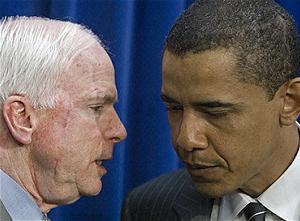
The Candidates 2008 and Domestic Issues
If you missed my analysis of where the presidential candidates stand on scientific issues, just know that I’ve decided to take a radical approach in deciding who to vote for this year. I’m going to look at the issues, not the personalities, and I’m going to attempt to ignore any preconceived notions I have about the parties they represent. I’m not going to let myself be swayed by silly talking points, nor am I going to assume outright that the candidates are big, fat liars. Most controversially, however, I’m going to ignore appearances; I don’t care that McCain is old or that Obama has black hair.
 | | It's a campaign of sweet nothings |
For this entry, I’m going to look at where the candidates stand on certain domestic issues. In this arena, it’s easy to make assumptions based on the political parties, as each party is unusually clear on many domestic issues. Most people versed in bipartisan politics are often confused by my take on domestic policy, though, as I am for legalized abortion and support drug decriminalization the way a typical Democrat would but also believe in the right to own a gun and don’t like the idea of government spending money on healthcare and education, much like a typical Republican. Still, my philosophy is pretty clear to me; the way I see it, the less government intervention, the better.
I’m not going to cover all of the bases here, as “domestic issues” is a pretty huge umbrella. Specifically, this blog is about education, healthcare, drugs, and immigration. Rest assured that other topics, like abortion, jobs, gay marriage, and gas prices, will be covered in the future. So, without further ado, let’s start with education.
Education
Most people recognize that our education system is far from the best in the world, and it seems like every politician has a different solution to the problem. Still, I’m optimistic. I do think there are ways to make it better—most of which involve less government interference, less red tape, and a lot less bureaucracy—but I have some faith in the system that taught me and the intelligence of the average American kid. I believe we should spend less time worrying about guns in schools, sex ed, intelligent design, mandated curriculums, standardized tests, and whether or not a teacher is allowed to touch a student on the shoulder, and spend more time thinking about how to better improve the standard of teaching. My ideal candidate would be one who would believe in academic freedom and in finding ways to pad the paychecks of every single school teacher in the country, even if it means forcing the government to relinquish control over the system. It’s reprehensible that we pay whiny actors tens of millions of dollars per movie but we can’t seem to spare fifty thousand a year for the person teaching our children arithmetic.
 | | The debate between red and blue begins in the schools |
On his website, McCain focuses on school choice and the power of competition, explaining how, if parents can freely choose to pull a child out of a poorly performing school and place them in another school, all schools will clamor to improve themselves. According to the Associated Press, McCain has stated that he is against nationally imposed standards or federal funding, believing that education should be handled by the individual states. He is willing to send federal education funds to the states, but it is up to the states to decide where and how to use them. My favorite quote of his on education comes from a debate nearly a decade old in which he stated, “I don’t see why a good teacher should be paid less money than a bad senator. It’s important that we have merit pay for teachers, that we have teacher testing, that we do everything we can to motivate young men and women to enter this profession. There’s a whole generation that’s retiring. It is unconscionable that the average salary of a lawyer is $79,000 a year and the average salary of a teacher is $39,000 a year.” Looking at his voting record, McCain has sponsored, co-sponsored, or supported a long list of education-related bills, with subjects like school savings accounts for low-income families, combating illiteracy, strengthening teacher preparation, creating nutritional enrichment programs for schools, and combating high drop-out rates.
Obama’s voting record on education isn’t nearly as long as McCain’s (length of service has more to do with it, of course, than anything else), but he has sponsored several bills that increase funding across the board, from increasing the Pell Grant to shifting corporate tax loophole money to education. He has also said that he is in favor of charter schools and merit pay for teachers, but he is wary of how teachers are assessed. He is very critical of the No Child Left Behind act, but wants to change it rather than repeal it, so that more districts across the country can implement it. All in all, Obama’s take on education seems to be to throw more money at it, which is not necessarily a bad idea.
Given the choice, though, I’d go with McCain on this one. It appears that Obama wants the federal government to be more involved in education than it probably should be, whereas McCain has more faith in individual states, districts, and the power of competition. Both want to give large sums of money to education and both are very clear that they want teachers to have better salaries, so I don’t think either really contradicts my main hopes here. Still, Obama’s line on wanting more involvement in teacher assessment (McCain is for teacher assessment as well, but he doesn’t want it to be regulated at the federal level, which is what Obama talks about), among other things, would likely lead to even more red tape than we already have and exacerbate some of the more endemic problems.
Healthcare
 | | If there's a problem, let's diagnose it first |
Ideally, I would prefer an education system free of all government control, but I know that’ll never happen. I feel pretty much the same way about healthcare. With every new government incentive from either side of the political spectrum, the healthcare problems in this country get worse rather than better. The shocking thing to me, though, is that the solutions are so simple. Prescription drug prices too high? Open up international drug trade, force competition, and everybody but the big pharma fatcat wins! Medical insurance getting too complicated and expensive? Stop the ridiculously over-the-top government regulations, offer legislative protections against frivolous litigation, and watch as the cost of insurance plummets, leading to drastic reductions in the price of all healthcare!
But there’s one problem: the “special interests.” When a politician talks about special interests nowadays, that politician is probably talking about a healthcare company. These companies are creating lifesaving technologies and doing great things for the world, but there’s a downside; they have their hooks in every politician, and the people at the top are in a race to see who can line their coffins with the most money. If a politician wants to commit political suicide, the best way to do it would be to introduce a way to actually reduce the cost of healthcare. Most politicians say they want to do just that—whether it’s Hilary trying to divert the costs to the taxpayer or Bush offering a way to start a savings account—but any idiot can see that the cost is getting higher, not lower. Therefore, I don’t believe my ideal candidate exists when it comes to healthcare, because they would never get the backing of the modern day robber barons of this country, whose influence is gospel.
McCain has acknowledged this, saying “There are no incentives in the system today. How could pharmaceutical companies be able to cover up the cost to the point where nobody knows? Why shouldn't we be able to reimport drugs from Canada? It's because of the power of the pharmaceutical companies. We should have pharmaceutical companies competing to take care of our Medicare and Medicaid patients.” However, the programs he talks about today are more focused on medical tax credits, savings accounts, and rewards for wellness, programs that, while not entirely useless, are the equivalent of a Band-Aid over a severed limb. He is against universal healthcare, and his current platform is best exemplified by the following quote:
The problem with health care in America, it's not the quality. It is the inflation. In all due respect to your expert that we just saw, he's talking about the wrong aspect of this issue. The right aspect of this issue is inflation, if we could get it under control and get it reduced so that health care costs are reasonable, then those people will be able to afford it. They will be able to go out and choose their insurer, and they will be able to then to get affordable health care. But we have to make the recipient of the health care more responsible. We have to have outcome-based results for health care. We have to emphasize wellness and fitness. One of the most disturbing things in America is the increase in diabetes, obesity and high blood pressure amongst younger Americans. So we have to award wellness and fitness. We'll have a healthier nation and we will have less health care costs. Some people here in New Hampshire have been to Canada. I don't think they want that system.
 | | Johnson & Johnson, in terms of sheer revenue, is the biggest pharmaceutical company in the world, but before you start hating it, consider how many of its products you use |
Obama, on the other hand, is deeply in favor of universal health care. He acknowledges that one of the core problems of the modern healthcare system is the lobbying of insurance and pharmaceutical companies. In a YouTube debate last year, he said, “We couldn't get [universal healthcare] done [in the 90’s] because the drug and insurance companies are spending $1 billion over the last decade on lobbying. And that's why we've got to have a president who is willing to fight to make sure that they don't have veto power.” Still, other than talking big about standing up to these companies, he doesn’t outline any new solutions to the problem other than finding ways to rearrange the budget so that the government can use taxpayer money to pay for it all. He emphasizes making sure every family in America who wants one can have a healthcare plan, but he doesn’t offer any ideas as to exactly how he will bring healthcare costs down, though he repeats often that he will do it.
On this issue, I think Obama has the slicker campaign, but I’m wary of any politician who thinks increased government spending is the solution to any domestic problem. McCain’s plan is more cohesive, though it does get muddled with unexplained promises the same way Obama’s does. While I think it’s great to hope that every American family can get the healthcare plan it wants, I’d prefer that healthcare plan to be based on a competitive market rather than a lowest common denominator that is bought and paid for by Washington. Though I think McCain wins this round, I’d be remiss not to mention that, while both candidates talk tough about fighting the special interests, neither candidate actually explains how they will stand up to the pharmaceutical and insurance companies responsible for the growing problem.
War on Drugs
In the past, I spent a lot of time talking about the “War on Drugs,” and made my controversial position fairly clear (if you're interested, check here, here, and here). Unfortunately, not many people got my point, and my rants on the subject devolved into what appeared to be the ravings of a mad man or worse. My opinions on the matter, though, have not changed. Put simply, I think that yes, drugs are bad, but no, they should not be illegal. I am pro-choice in most aspects of life, and if a person wants to destroy his or her life in the futile pursuit of happiness in a pill or injection, that’s their choice. The effort to control a vice results in more crime, not less crime, and the price of repressing a basic freedom is always higher than the price of having faith in people to make their own decisions (this was the lesson of prohibition, was it not?). Therefore, I would hope to find a candidate that would encourage a steady and controlled arms reduction in the war on drugs, so that we might give peace a chance (and stop spending beyond ludicrous amounts of money endlessly chasing our tails). And before you ask, no, I am not a drug addict.
 | | Mmkay? |
John McCain is clearly a hawk when it comes to the war on drugs. Back in 2000, according to the Boston Globe, he “wants to increase penalties for selling drugs, supports the death penalty for drug kingpins, favors tightening security to stop the flow of drugs into the country, and wants to restrict availability of methadone for heroin addicts.” Last year, McCain applauded the Mexican president for extraditing drug dealers to the United States for federal prosecution, and in the last fifteen years he has voted to increase federal spending on the war by well over a billion dollars.
Obama, on the other hand, wants to expand substance abuse counseling and treatment, as well as help ex-offenders re-integrate into society. He supports confronting disparities in drug sentencing laws and has questioned the effectiveness of harsh penalties for drug violations. Obama, an admitted pot-smoker, cocaine experimenter, and drinker in his youth—as well as a closet cigarette smoker today—says he is sympathetic of the drug user. He did cosponsor a bill to address loopholes in the Combat Methamphetamine Epidemic Act of 2005, the moderately successful act requiring increased limits on the sale and distribution of common over-the-counter pharmaceuticals that can be used to make crystal meth, among other things.
Obama, at least, doesn’t want to throw gasoline on the raging inferno that is the war on drugs, but he has never made any public statements regarding the legalization or decriminalization of illegal drugs (most likely because such statements would be political suicide). Therefore, I would resoundly vote for him if the drug war were the only relevant issue, because he is a step in the right direction. McCain is a giant leap backwards into more useless government spending, increased police power and prison overpopulation, and a much more repressive form of prohibition.
Immigration
Of all four of these domestic issues, immigration is the one I know the least about. I know there’s a vague problem with immigration, whether it be that it’s too difficult or too easy for people to get into this country. I think our borders should be open to anyone looking for a better life in America—since that’s the bedrock of our nation—but I also think we need to be careful in letting potential terrorists on our soil. From a purely thought experiment position, though, I don’t think the latter is as much a problem as the former, since we’ve really only let nineteen lethally dangerous terrorists get here and do damage. However, I do think that illegal immigration is problematic from a social and economic perspective, but I’m not sure who is ultimately to blame for it. So, as my opinion on this subject is muddled and uninformed, I go into my research on the candidates’ positions with as open a mind as possible.
The Libertarian Perspective
Bob Barr is a difficult man to pin down. Though he claims to be a Libertarian, he has voted to increase federal rules on medical litigation—which he only wants to restrict monetarily. He did vote for school vouchers on more than one occasion, and supports allowing prayer in schools. Still, it’s his stance on the war on drugs I find most surprising, as he voted against medical marijuana in DC and voted for increased border patrols to battle both drugs and terrorism. He is hawkish about border security, and voted against more immigrant visas for skilled workers.
 If it were a choice between all three candidates and these issues were the only relevant ones, I’d probably still choose McCain. Their stances are similar in a lot of ways, but where they differ, I prefer McCain’s ideas to Barr’s. If it were a choice between all three candidates and these issues were the only relevant ones, I’d probably still choose McCain. Their stances are similar in a lot of ways, but where they differ, I prefer McCain’s ideas to Barr’s.
|
McCain’s take on immigration doesn’t help clarify it, though. While he has very recently supported and even written broad legislation that gives ways for millions of illegal immigrants to acquire citizenship, he has gone on record saying that he has changed his mind based on the “situation” today. He is in favor of rounding up and deporting illegal immigrants who have committed other crimes, and wants to find ways to deal with the rest of them on a case-by-case basis. His main push today, though, is border security, which is certainly important. At the 2008 Conservative Political Action Conference, McCain stated that he has “pledged that it would be among my highest priorities to secure our borders first, and only after we achieved widespread consensus that our borders are secure, would we address other aspects of the problem in a way that defends the rule of law and does not encourage another wave of illegal immigration.” Additionally, McCain is against laws restricting human services to illegal immigrants, supported declaring English the official language of the country, and voted for the Guest Worker Program.
While Obama refers to illegal immigrants as “undocumented workers,” his stance is surprisingly similar to McCain’s. Like McCain, Obama emphasizes border security, putting undocumented workers “to the back of the line” in terms of acquiring citizenship, and not forbidding basic healthcare to illegals. However, he is against widespread deportation, calling it impractical and ridiculous (though Obama is referring to deporting twelve million, not the two million McCain talks about), and believes immigration raids to be largely ineffective. Obama thinks illegal immigrants are scapegoats when it comes to unemployment rates, and that their children should be treated as first class citizens along with everybody else.
In fact, the candidates’ stances on immigration are so similar in their basics that I have a hard time choosing between them, especially considering my own ignorance when it comes to this issue. I can see pros and cons to both arguments, though. With McCain’s plan, I agree with his point that securing the border is the primary concern, to keep the situation manageable while we then sort out the illegal immigrants and deal with them in a fair, legal, and case-by-case methodology. However, this plan, along with the deportation of two million people, is a dangerously expensive drain on many aspects of the system. Obama takes a more humanitarian approach, and I agree with his principles, but his plan seems less comprehensive than McCain’s. He does outline ways to improve border security, and he is absolutely right when he calls illegal immigrants scapegoats and when he calls for ways to ensure that their children be treated the same as all American children. So, with reservation, I say both candidates are viable here, and I won’t choose one over the other on the basis of immigration.
My Choice if These Domestic Issues were the Only Relevant Issues
The main point I’m trying to make with these essays is that there are pros and cons to each candidate. If you support one candidate over the other, the world will not end if your man loses, nor will America become a paradise if he wins, and you don’t have to agree with my reasoning to see that. I explained last time how I’d choose Obama by a thin margin if science were the only relevant issue, and this time, I’d pick McCain, again by only a thin margin, if these domestic issues were the only relevant issues.
  |
| The Candidates and Domestic Issues |
  |
|
McCain gets it mostly right, in my opinion, when it comes to education and healthcare, because he wants to loosen government controls over these systems. He encourages capitalistic choice, a power not to be underestimated, and he does not approve of a governmentally regulated universal healthcare system, a behemoth of red tape and paperwork that would drown the sick and dying. Still, he wants to increase government control and regulation of the war on drugs, making a bad situation that much worse because he refuses to accept the lessons of history. Obama may be the better and more compassionate choice when it comes to illegal drug users, but the amount of spending he wants for all four of these issues is staggeringly high, and it’s hard to overlook the fact that he wants education and healthcare regulated at the federal level.
No doubt your own political persuasion will affect your opinion here. I know that not all of my readers—and definitely not all Americans—believe in a smaller government, and the idea of increased federal controls on healthcare, education, illegal drugs, and immigration might not seem so bad to everyone. So, with that in mind, let me be clear: I’m not trying to make up your mind for you. All I’m trying to do here is give you the issues in the clearest way I can and give you my spin on them. I do not pretend to be unbiased, because anybody who does is being dishonest; I just hope I can prove that I am at least informed.
-e. magill, 07/21/2008
|
|